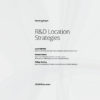The advent of artificial intelligence is changing the task allocation of workers and machines in firms’ production processes with potentially wide ranging effects on workers and firms. We develop an agent-based simulation framework to investigate the consequences of different types of automation for industry output, the wage distribution, the labor share, and industry dynamics. It […]






